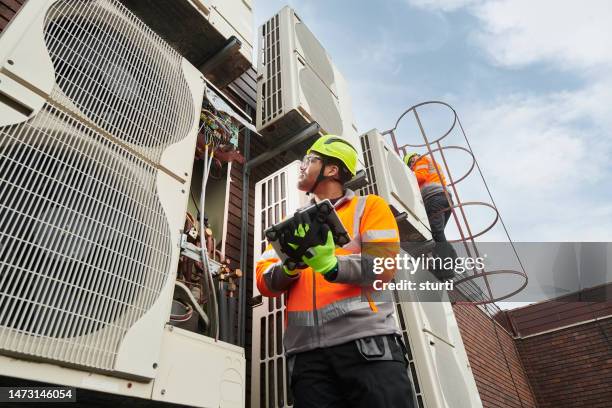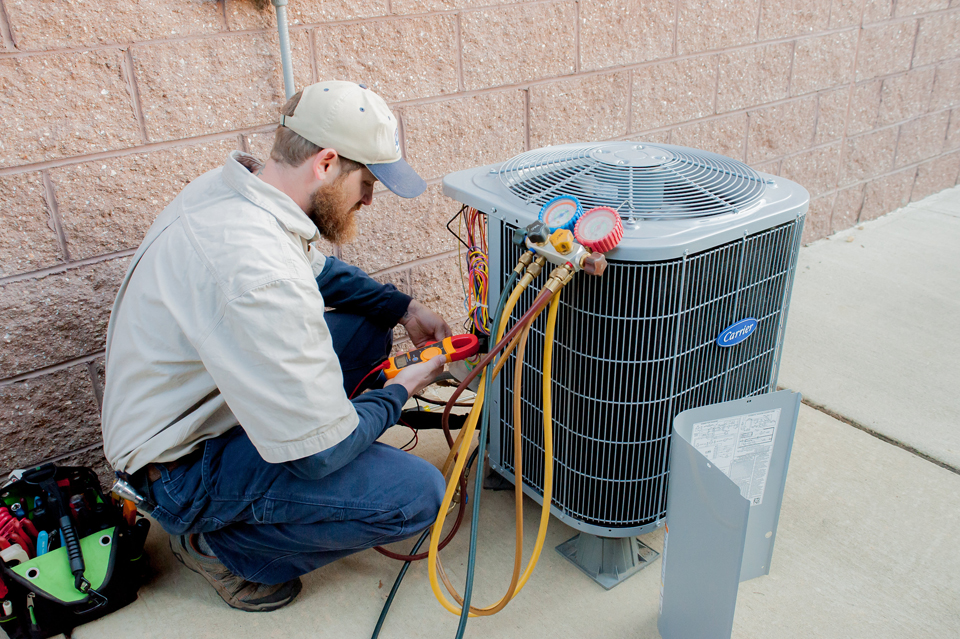heat pump service: What to Expect and Why It Matters
heat pump service: What to Expect and Why It Matters
Blog Article
Choosing In Between a Heatpump and Furnace: Key Factors To Consider for Your HVAC Needs
When reviewing home heating choices for heating and cooling needs, the choice in between a heatpump and a heater can be complicated. Each system provides distinct benefits customized to particular climates and power effectiveness goals. Comprehending these differences is crucial for making an enlightened option. Key aspects such as installment costs and environmental influence additionally make complex the selection process. Which choice genuinely lines up with one's convenience and sustainability preferences? The complying with sections will certainly explore these factors to consider carefully.
Understanding Heat Pumps: How They Function and Their Benefits
While lots of property owners consider numerous heating alternatives, understanding just how heat pumps function and their benefits can significantly affect their decision. Warm pumps run by moving warmth instead of generating it. In the winter, they draw out heat from the outdoors air or ground and transfer it inside, while in the summertime, they reverse this procedure, cooling down the home by eliminating heat outside. This dual capability makes them versatile for year-round climate control.One of the key advantages of heatpump is their energy performance. They utilize substantially less power contrasted to typical home heating systems, possibly leading to lower utility bills (heat pump service). Furthermore, warmth pumps have a smaller sized carbon footprint, making them an eco pleasant selection. They also require less maintenance than conventional systems, adding to long-term cost savings. Generally, comprehending the technicians and benefits of heatpump can aid home owners make educated choices concerning their heating and cooling down requirements
Discovering Heaters: Kinds, Procedure, and Benefits
Heaters can be found in numerous kinds, consisting of gas, electric, and oil models, each with distinct operational devices. Recognizing these distinctions is crucial, as they influence performance and heating efficiency. Additionally, heating systems offer countless benefits, such as regular heat output and integrity in chillier environments.
Sorts of Heaters
Heating systems can differ significantly in style and operation, with heaters being a preferred selection among home owners. There are numerous kinds of heaters, each making use of various gas sources and technologies. Gas heaters are common, leveraging natural gas to create warm successfully. Electric heaters, on the various other hand, use electrical resistance to produce warmth, usually favored for their simple installation. Oil heaters, while much less typical, are efficient in areas with minimal gas gain access to (heat pump service). Furthermore, condensing heating systems take full advantage of power efficiency by catching and recycling exhaust gases. Each kind runs with a system of heat exchangers and ductwork to disperse warm air throughout a home. Understanding the differences between these heating system types is vital for educated heating and cooling decisions
Advantages of Heaters
For house owners looking for dependable heat during cold months, the advantages of heating systems are substantial. Heaters give constant home heating, making certain also temperature levels throughout the home. They are especially effective in severe cold, typically outshining warmth pumps in cold problems. Various types, consisting of gas, electrical, and oil heaters, offer versatility to meet diverse requirements and preferences.Furnaces additionally tend to have lower preliminary installment expenses contrasted to warmth pumps, making them an extra accessible option for numerous. Their robust design contributes to a much longer life-span, with several systems lasting over 15 years with appropriate maintenance. Additionally, modern-day heating systems are usually outfitted with sophisticated innovation for boosted performance, which can bring about lowered power expenses. In general, heating systems remain a reliable choice for effective home heating.

Energy Effectiveness: Contrasting Heat Pumps and Furnaces
When comparing power efficiency between warmth pumps and furnaces, the Seasonal Energy Performance Ratio (SEER) plays a vital duty in identifying performance. In addition, an operational cost evaluation reveals the lasting monetary implications of each system. Comprehending these variables can guide house owners in making educated decisions about their heating options.
Seasonal Power Performance Proportion
Energy effectiveness plays a crucial role in the decision-making procedure in between heat pumps and furnaces, particularly when taking into consideration the Seasonal Energy Effectiveness Proportion (SEER) This statistics actions the cooling performance of heatpump over a whole cooling period, supplying a standard way to review performance. Greater SEER scores indicate greater energy efficiency, translating to lower energy intake and reduced utility costs. On the other hand, heaters are generally evaluated using the Annual Fuel Application Effectiveness (AFUE) score, which shows heating efficiency. When comparing these 2 systems, house owners must prioritize SEER ratings for heatpump, as they directly effect overall energy financial savings and ecological sustainability. A comprehensive understanding of SEER can especially influence the long-lasting satisfaction and cost-effectiveness of the picked a/c option.
Functional Cost Analysis
Recognizing the functional costs connected with warmth pumps and heating systems is vital for homeowners reviewing their choices. Warm pumps typically supply higher power effectiveness, transforming electric power into warmth with very little waste. This results in lower monthly utility costs, especially in modest climates. Alternatively, advice conventional heaters, especially gas versions, might have reduced ahead of time costs however can sustain greater operational expenditures in time as a result of fuel costs and effectiveness ratings.Moreover, heatpump can operate as both home heating and cooling systems, possibly reducing the need for separate a/c systems. While first financial investments for heatpump may be greater, their long-lasting savings in energy efficiency can make them a much more economical selection for several homes. Cautious analysis of local power rates is necessary to figure out the best choice.
Setup Prices: What to Anticipate for each and every Furnace
Setup prices for furnace can vary considerably between heat pumps and heating systems, influencing homeowners' choices. Warm pumps generally have greater upfront installment prices, usually varying from $3,500 to $8,000, depending upon the device size and intricacy of installation. This consists of the outdoor device, interior handling system, and necessary ductwork adjustments. On the other hand, heating systems often tend to have lower initial costs, balancing in between $2,500 and $6,000, which can be appealing for budget-conscious property owners. Nonetheless, installation expenditures can increase if extensive ductwork is required.Moreover, the selection of gas type for furnaces-- all-natural gas, lp, or electrical-- can additionally affect setup costs. While heat pumps supply energy effectiveness, their first investment might prevent some purchasers. Inevitably, assessing setup costs alongside long-lasting financial savings and effectiveness will aid house owners in making informed decisions concerning their furnace.
Environment Factors To Consider: Which System Performs Better in Your Location
How do environment problems affect the effectiveness of heating unit? The performance of heatpump and heaters can differ considerably relying on the local environment. In modest climates, heatpump excel by successfully transferring heat from the outdoors air, making them an energy-saving alternative. Their effectiveness decreases in extremely cool temperature levels, where they might struggle to extract sufficient heat. Conversely, heaters, especially gas versions, give dependable and regular heat no matter exterior conditions, making them more suitable in colder regions.In locations that experience milder winter seasons, warmth pumps can operate properly year-round, providing both heating & cooling. In contrast, areas with harsh winters often gain from the effectiveness of furnaces. Inevitably, recognizing the regional environment is important when deciding between a heat pump and a heating system, as it straight impacts their operational effectiveness and overall performance.
Maintenance Needs: Long-Term Look After Warm Pumps vs. Furnaces
While both warm pumps and furnaces call for regular upkeep to ensure peak performance, their particular needs and care regimens differ significantly. Furnaces typically require much less frequent interest, with yearly inspections sufficing to look for gas leakages, tidy filters, and evaluate general capability. Their less complex layout often enables straightforward repairs.In comparison, heatpump demand biannual maintenance because of their dual function in home heating and air conditioning. This consists of cleansing coils, checking refrigerant degrees, and ensuring that both the outside and indoor devices operate at their ideal. Additionally, heatpump upkeep commonly entails even more intricate parts, making specialist my latest blog post maintenance essential.Neglecting upkeep can result in reduced effectiveness and increased power expenses for both systems. Ultimately, house owners should consider these long-lasting treatment needs when selecting in between a heat pump and a heater, as proactive maintenance can expand the lifespan and performance of either system substantially.
Ecological Effect: Selecting a Lasting Heating Choice
The environmental impact of heater is a critical examination for house owners looking for sustainable choices. Heatpump are typically extra energy-efficient than traditional heaters, as they move heat rather than create it, considerably reducing carbon emissions. By utilizing renewable resource resources, such as air-source or geothermal heatpump, property owners can further decrease their ecological footprint.On the various other hand, gas furnaces send out greenhouse gases and contribute to air pollution, though they typically offer greater heat result. Nevertheless, developments in modern technology have actually led to the development of high-efficiency heaters that minimize emissions.Ultimately, selecting a heating unit includes evaluating efficiency versus ecological influence. Home owners are motivated to assess regional power sources and rewards for renewable systems, ensuring a selection that lines up with both individual comfort and ecological obligation. The choice affects not only prompt convenience yet also lasting sustainability and environmental wellness.
Regularly Asked Inquiries
How Much Time Do Heat Pumps and Furnaces Generally Last?
The lifespan of heat pumps normally varies from 15 to 20 years, while furnaces can last in between 15 to thirty years. Regular upkeep significantly influences their longevity and effectiveness in supplying home heating remedies.
Can I Make Use Of a Warm Pump in Extremely Cold Climates?
Warmth pumps can run in incredibly cold environments, but their performance decreases as temperatures drop. In such problems, supplemental home heating resources may be necessary to maintain comfortable interior temperatures and assure peak efficiency.

What Is the Noise Level of Warmth Pumps Versus Furnaces?
The noise degrees of heatpump and heating systems vary substantially. Usually, heatpump operate more silently than traditional furnaces, making them preferable for those conscious sound, while furnaces might produce louder operational noises during heating cycles.
Are Heat Pumps Suitable for Both Heating & Cooling?
Heatpump are indeed ideal for both heating & cooling (ductless mini splits). They operate by transferring warm, providing efficient temperature control year-round, making them a functional choice for home owners looking for an all-in-one heating and cooling option
What Dimension Heating System Do I Need for My Home?
Identifying the appropriate size heating system for a home calls for examining variables such as square video, insulation top quality, local environment, and the home's layout. Consulting a professional can guarantee an exact evaluation and suitable convenience. Warm pumps commonly provide higher energy performance, converting electrical energy into warm with very little waste. In modest environments, warm pumps succeed by efficiently transferring warm from the outside air, making them an energy-saving choice. Alternatively, heaters, specifically gas models, give dependable and constant heat regardless of exterior conditions, making them more effective in heat pump replacement ooltewah tn cooler regions.In areas that experience milder winters months, warm pumps can operate successfully year-round, providing both home heating and air conditioning. Warm pumps are typically much more energy-efficient than traditional heaters, as they transfer warm rather than produce it, considerably reducing carbon exhausts. By utilizing renewable power resources, such as air-source or geothermal warm pumps, house owners can better minimize their ecological footprint.On the other hand, all-natural gas furnaces give off greenhouse gases and contribute to air contamination, though they commonly provide higher heat output.
Report this page